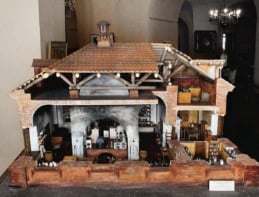
Meet writer and theatre director Jon Spooner, who has bagged the Unique Shed of the Year 2019 award from the garden paint and stain supplier Cuprinol. His mobile shed is dubbed the Unlimited Space Agency (UNSA) and is on a mission round the UK “to inspire the next generation of scientists and space explorers through interactive storytelling”.
According to Spooner, UNSA normally looks like a garden shed. But when it “powers on” it unfolds to create a stage complete with integrated sound and lighting (see figure).
If you happen to be in London on 10-14 October you can catch Spooner’s show at New Scientist Live.
Spooner has also done audio interviews with scientists (including physicists Jen Gupta, Alexandra Amon and Jon Butterworth) that are available on his Space Shed podcasts.
Let’s say you had an infinite amount of one thing – electrons, helium or maybe neutrinos. Could you make that monoculture of stuff interact with itself to create an infinite amount of everything? An interesting question that physicist and author Chad Orzel addresses in his latest blog in Forbes. Orzel concludes the smaller the thing, the more difficult the task.
For those of us of a certain age, physics is wedded to blackboards filled with byzantine equations. Such visions are gone for good at many schools and universities, where interactive white boards now rule supreme. But some holdouts are still using blackboards, and the photographer Jessica Wynne has captured some of their scribblings in a book that will be published next year. Wynne focussed on mathematicians, but her photographs are sure to appeal to physicists. You can see a selection of her work in the New York Times with a commentary from the science writer Dennis Overbye.



